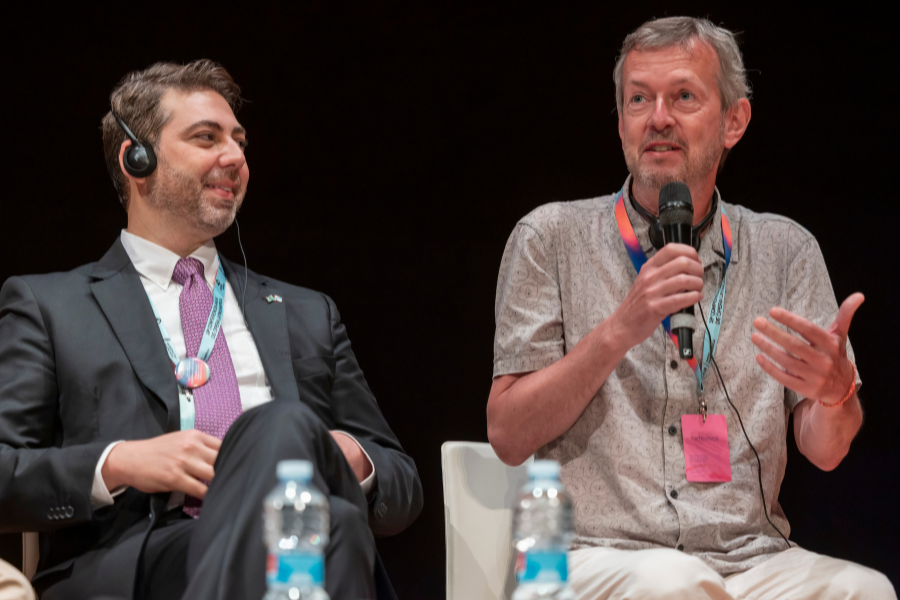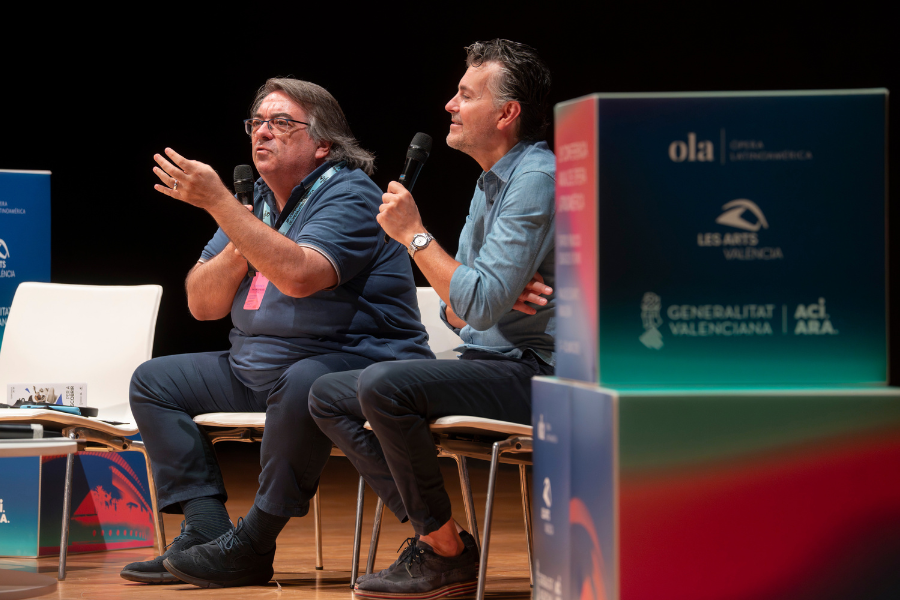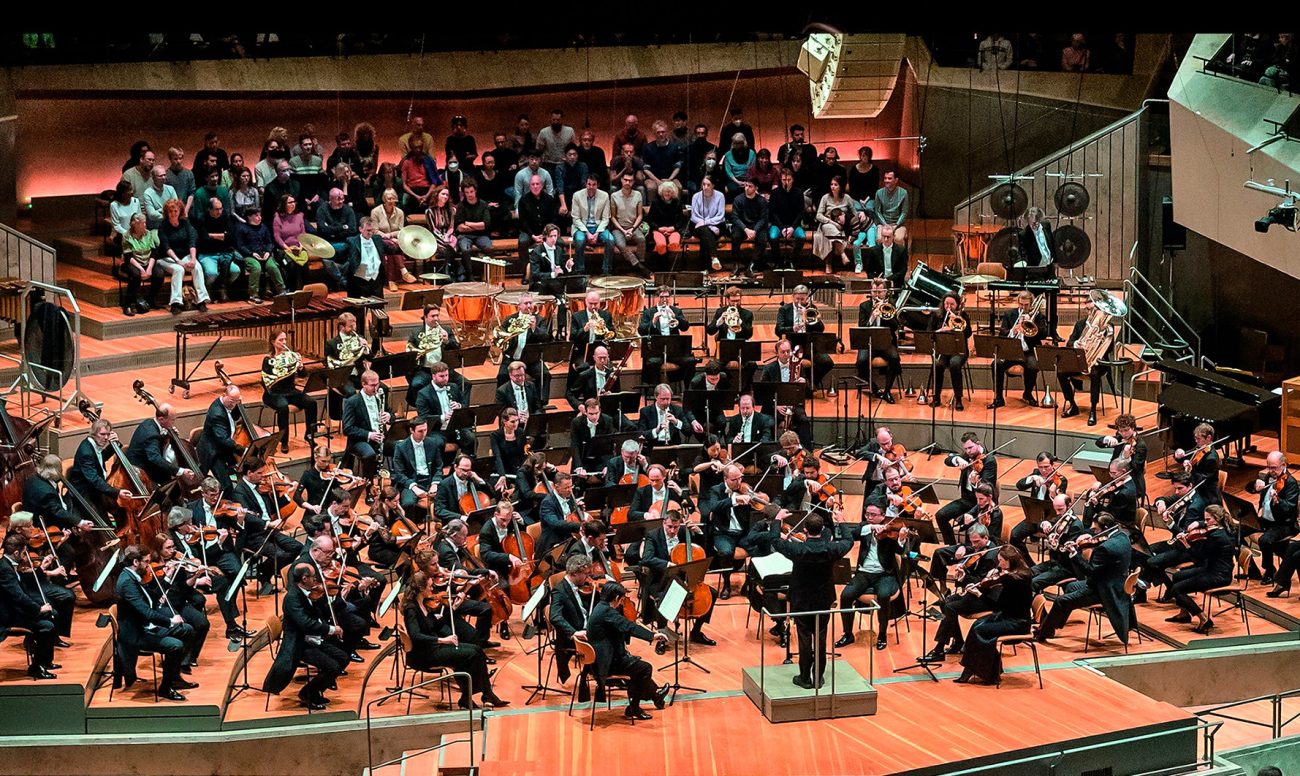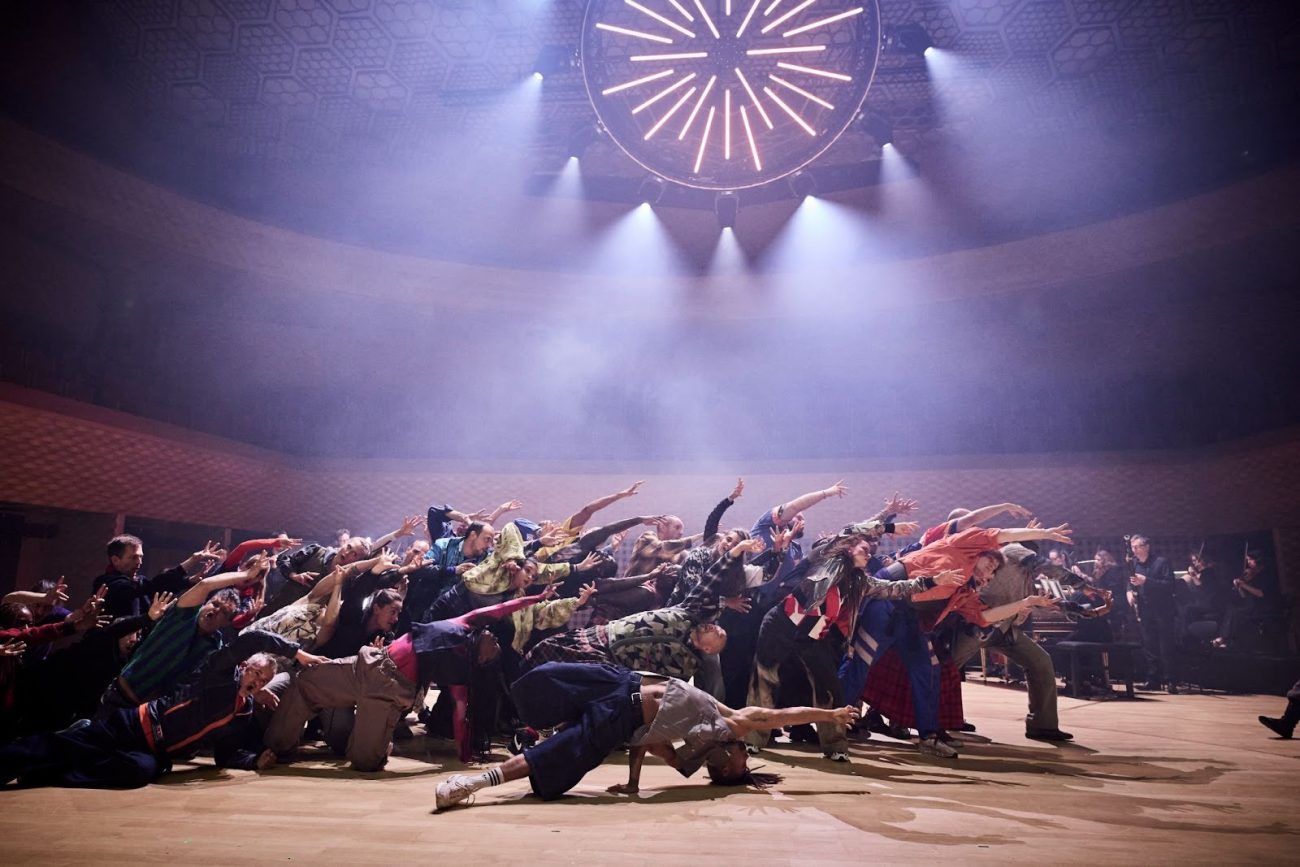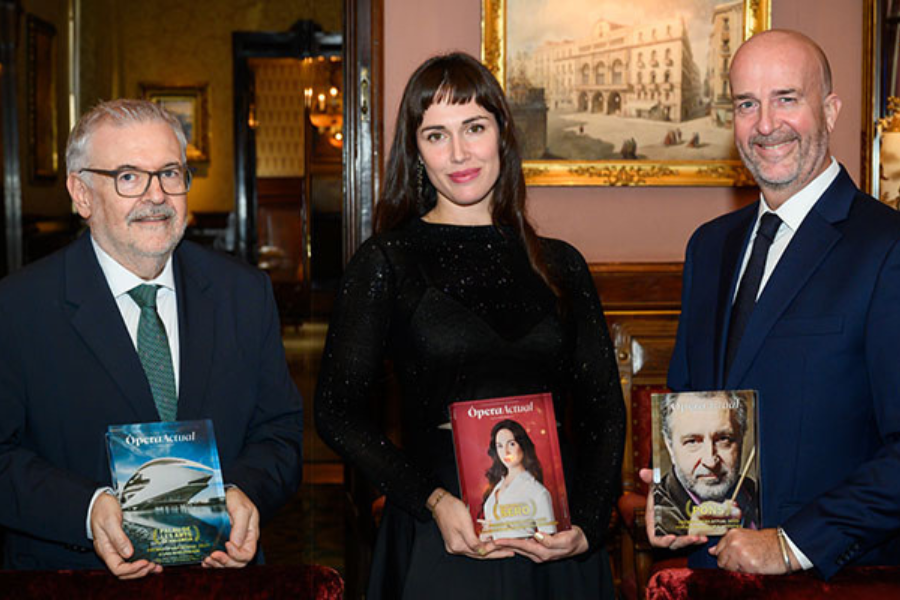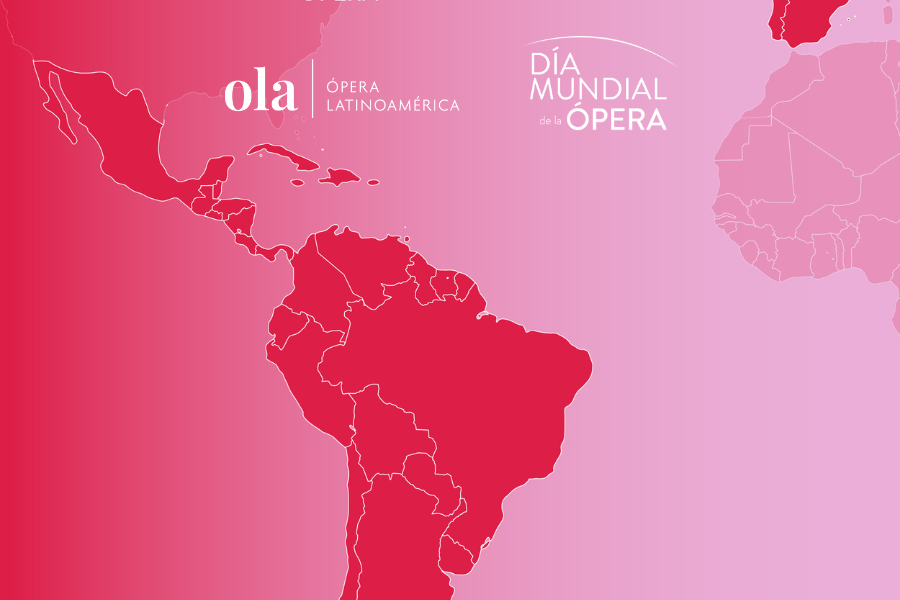18ª Conferencia Anual de OLA: De los nuevos vínculos con los públicos a desafíos en sostenibilidad y políticas públicas
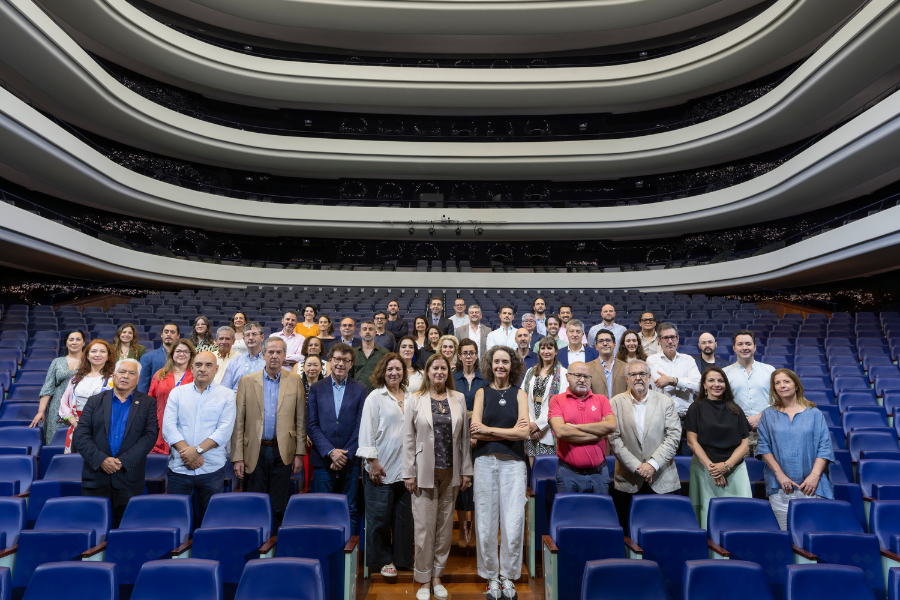
Del 17 al 20 de junio, el Palau de les Arts Reina Sofía de Valencia acogió la 18ª Conferencia Anual de Ópera Latinoamérica (OLA), reuniendo a representantes de teatros, festivales y compañías de ópera de Iberoamérica y Europa. Bajo el lema Teatros: Públicos e ideas del futuro, esta edición abordó los ejes de programación y contenidos artísticos para públicos, sostenibilidad e inversión en cultura y la comunicación de las artes escénicas, planteando los desafíos para el presente y futuro del sector.
Fueron en total 120 las personas asistentes a esta 18ª edición de la Conferencia Anual de OLA, entre directoras, directores y representantes de teatros, festivales y compañías de ópera de Iberoamérica –incluyendo 39 organizaciones pertenecientes a la red de OLA–, además de líderes de la gestión cultural, la programación artística y los sectores públicos y privados provenientes de 15 países.
Durante los cuatro días en que las diferentes salas y auditorios del Palau de Les Arts Reina Sofía acogieron la conferencia, surgieron nuevas conclusiones y avances en las temáticas que OLA ha integrado en sus últimas conferencias.
Desde la consolidación del Foro de Mujeres de OLA –que ya cuenta con una nutrida agenda de actividades como mentorías y nuevos encuentros–, pasando por las acciones concretas que se han desprendido de la Declaración de Barcelona a tres años de su proclamación –como nuevas coproducciones y circulaciones de innovadoras creaciones líricas latinoamericanas–, hasta la elaboración de nuevas comisiones especializadas y fuentes de información para definir nuevos objetivos y acciones, la 18ª Conferencia Anual de OLA propició ideas del futuro en torno a temáticas como la sostenibilidad, la programación artística y los desafíos en materias de género y medioambientales.
Varias de estas materias serán recogidas nuevamente en 2026 durante la 19ª Conferencia Anual de OLA, que se llevará a cabo entre el 16 y 19 de junio con el Teatro Municipal de Lima (Perú) como anfitrión.
A tres años de la Declaración de Barcelona
El miércoles 18 de junio, la sesión inaugural se realizó en conjunto entre OLA y la asociación española Ópera XXI (ÓXXI) para repasar el acuerdo entre ambas instituciones, materializado en la Declaración de Barcelona que se estableció en 2022.
En abril de 2022, más de 60 organizaciones de Argentina, Brasil, Chile, Colombia, Ecuador, Costa Rica, México y Uruguay representadas por Ópera Latinoamérica, junto a instituciones españolas lideradas por Ópera XXI, se reunieron en el Gran Teatre del Liceu de Barcelona en el Encuentro Iberoamericano de Teatros para reflexionar sobre las transformaciones que atravesaba el mundo en materias geopolíticas, humanitarias, sociales, medioambientales, tecnológicas y culturales.
El encuentro de ese entonces estableció líneas de trabajo para generar propuestas de valor dirigidas a las comunidades de Iberoamérica, las que se tradujeron en siete propuestas enfocadas en el fomento de la circulación, la coproducción, el traspaso de buenas prácticas y la sensibilización sobre el rol social y la sostenibilidad medioambiental de las organizaciones dedicadas a la ópera y las artes escénicas.
“Desde hace 3 años que la mirada de OLA ha estado puesta en cómo nuestro trabajo aporta a la transformación social. En Barcelona 2022, tras la pandemia, nos reunimos, para cuestionar de forma holística nuestras instituciones y diseñar un plan de acción conjunto para los próximos años, a partir de nuestra historia y desafíos comunes”, expresó Paulina Ricciardi, directora ejecutiva de OLA en la apertura de la sesión inaugural.
Entre los proyectos que ambas organizaciones han impulsado a raíz de esta declaración, se encuentra un Programa de Mentorías también insertado en el Foro de Mujeres OLA y que inició durante el primer semestre de 2025. Este programa inédito cuenta con asesoría de la organización chilena Mujeres Empresarias y tiene como objetivo apoyar y potenciar el desarrollo profesional de mujeres que trabajan en las instituciones que integran la red de OLA y que se encuentren en un estadio inicial o intermedio de su carrera profesional.
En paralelo, se han potenciado las coproducciones y la circulación de óperas entre teatros de Latinoamérica y España, como es el caso de Domitila, ópera de cámara del compositor brasileño João Guilherme Ripper, estrenada en 2000 en Río de Janeiro y programada durante la Temporada 2024-2025 del Teatro de la Zarzuela.
Otra ópera que se ha sumado a esta circulación transatlántica es Patagonia, del compositor chileno Sebastián Errázuriz, una coproducción entre los teatros Biobío y del Lago, ganadora del premio Ópera XXI a la Mejor Ópera Latinoamericana en 2023 y que se presentó en el mismo teatro madrileño durante su última temporada.
Además, el Auditorio de Tenerife inaugurará su Temporada 2025-2026 con Yerma, ópera de Heitor Villa-Lobos, en una nueva coproducción junto con el Teatro de la Zarzuela y Festival Amazonas de Ópera de Manaos, Brasil.
Luego, en línea con la promoción y difusión de la nueva creación lírica latinoamericana, desde OLA se ha impulsado el proyecto Explora Iberoamérica. Con el apoyo de CAF – Banco de Desarrollo de América Latina y el Caribe, esta nueva sección disponible en el sitio web y las redes sociales de OLA busca destacar, a modo de catálogo, las nuevas producciones y óperas creadas en Latinoamérica.
Ejemplos recientes de estas nuevas creaciones son las óperas Llacolén, con música de Víctor Hugo Toro y libreto de Gonzalo Cuadra y estrenada en el teatro de la Corporación Cultural de la U. de Concepción (Chile), Oposicantos, del brasileño Flo Menezes y estrenada en la actual temporada del Theatro São Pedro de São Paulo, y La vorágine, de João Guilherme Ripper, una coproducción entre el Centro Nacional de las Artes y La Compañía Estable.
A futuro, ambas organizaciones acordaron la próxima creación del Foro de Sostenibilidad OLA, con el objetivo de atender los principales desafíos en materia medioambiental que enfrentan los teatros, festivales y compañías miembro de ambas organizaciones.
Por último, la sesión conjunta definió un comité de seguimiento conformado por dos miembros de OLA y dos miembros de ÓXXI, quienes se reunirán para repensar las acciones concretas trazadas y definir nuevos desafíos según las necesidades de ambas organizaciones. El comité quedó conformado por José Luis Rivero, director artístico del Auditorio de Tenerife, Conceçao Amaral, presidenta del Teatro São Carlos de Portugal, Andrea Caruso, directora general del Theatro Municipal de São Paulo, y Gerardo Grieco, director general del Teatro Colón de Buenos Aires.
La programación artística: Donde la tradición convive con las nuevas miradas
La primera jornada comenzó con una conversación entre Joan Matabosch, director artístico del Teatro Real de Madrid, y Carmen Gloria Larenas, directora general del Teatro Municipal de Santiago. El encuentro, titulado Conversación off, fue un espacio distendido y generoso en el que los presentes conocieron de cerca la lógica, desafíos, criterios y balances a la hora de programar, otorgando un preámbulo a las jornadas de los días siguientes.
Para el director español, la tradición es un capital que debe ser gestionado cuidadosamente, pero no puede convertirse en un límite. “La programación de cada temporada en el Teatro Real –en las que conviven títulos clásicos como Die Meistersinger von Nürnberg y nuevas propuestas como Tejas verdes de Jesús Torres, como es el caso de su Temporada 2024-2025– debe responder a objetivos alineados con las necesidades actuales y con la comunidad que asiste, considerando también la tradición”, señaló.
Matabosch subrayó la importancia de ofrecer un repertorio diverso y actual, y no repetir siempre las mismas obras, recordando que las grandes óperas clásicas “fueron disruptivas en su tiempo y reflejaban a la sociedad como era en ese momento”.
Sobre su método de trabajo con directores de escena, Matabosch explicó que su elección se basa en conocer a fondo su lenguaje y visión: “Hay un trabajo de entender al artista, de conocerlo, y saber que la forma en que relata las historias se alinea con la visión del teatro. Por eso, tengo la confianza de dar libertad absoluta”.
Equidad de género y diversidad: reflexiones desde el Foro de Mujeres OLA
A dos años de su creación en la 16ª Conferencia Anual de OLA en Manaos, Brasil, el Foro de Mujeres OLA abrió por primera vez sus sesiones al público, con el objetivo de abrir la conversación a todos los miembros de OLA y participantes de la conferencia para compartir los desafíos y oportunidades en materias de liderazgo femenino en las artes escénicas y trazar líneas de trabajo colaborativo.
La sesión contó con un programa que incluyó una keynote de Julia Sánchez Abeal, CEO de la Escuela Superior de Música Reina Sofía, y un panel con Flavia Furtado, directora del Festival Amazonas de Ópera, y Andrea Caruso, directora general del Theatro Municipal de São Paulo, moderado por Valentí Oviedo, director general del Gran Teatre del Liceu.
En su presentación, Sánchez Abeal presentó datos e información para mostrar la participación femenina en la Escuela Superior de Música Reina Sofía, la que en algunas disciplinas como composición y dirección musical alcanza porcentajes casi nulos.
Ante ese escenario, Sánchez Abeal destacó que “la base para conseguir el cambio es la educación”, razón por la que su institución ha implementado programas con perspectiva de género desde la formación.
Algunas de estas acciones concretas y abordajes múltiples que la escuela ha impulsado para paliar el déficit de participación o las brechas de género son el Programa de Emprendimiento e Innovación Social –que ha presentado proyectos de estudiantes enfocados en temas de género como Purple (2019), una propuesta que da voz a mujeres que han sufrido violencia o abuso o Devolviendo la voz (2021), que buscó reconocer el trabajo de mujeres compositoras en la historia–, la inclusión de una mujer como directora de la camerata de la escuela en 2025 y un ciclo de mujeres compositoras que está programado para el 2026 próximo.
Aunque “el 48% de los papeles en ópera son para mujeres”, Sánchez Abeal explicó que esto se debe a roles establecidos, mientras que, en áreas como la dirección de orquesta o la composición, la presencia femenina es mínima. “No estamos incorporando a la mujer en el proceso de determinar los cánones y las corrientes estéticas que definen el momento”.
El panel posterior abordó la equidad desde diferentes ángulos. Flavia Furtado recordó que más del 50% de los cargos directivos en los teatros miembros de OLA están ocupados por mujeres, aunque persisten desigualdades, especialmente salariales. Llamó a la reflexión y a la acción conjunta: “Nosotras vamos a pasar, pero las instituciones se quedarán. ¿Cómo van a recibir las futuras generaciones una estructura más igualitaria en todo?”
Andrea Caruso presentó datos sobre brechas de género a partir de los resultados de la encuesta Equality & Diversity in Global Repertoire, elaborado por la organización Donne – Women in Music y que analizó el repertorio interpretado por 111 orquestas en 30 países durante las temporadas 2023-2024.
Uno de los hallazgos principales del estudio revela que solo el 7,5% de las obras fueron compuestas por mujeres, lo que representa una leve disminución respecto al 7,7% del año pasado. De ese total, el 5,8% fueron compuestas por mujeres blancas, mientras que las obras de mujeres pertenecientes a la mayoría global representaron apenas el 1,6%.
La tercera edición del Foro de Mujeres de OLA se caracterizó por una estructura que paulatinamente se va consolidando, concluyendo la importancia de visibilizar las brechas de género existentes en las organizaciones artísticas a través de datos concretos e informes de impacto, destacar el trabajo de mujeres a nivel artístico y profesional y, finalmente, buscar que se propicien espacios de diálogo en los que prime el trabajo conjunto entre todos los géneros.
Por último, esta edición del foro también destacó por delinear una agenda a futuro que va tomando forma. Durante 2025, el foro está impulsando un programa de mentorías para mujeres que trabajan en los teatros, festivales y compañías de OLA en colaboración con la organización chilena Mujeres Empresarias. Además, se anunció la próxima edición del foro, que tendrá lugar en septiembre de 2025 durante una nueva versión del encuentro Abram Alas, en el Theatro Municipal de São Paulo.
Públicos y contenidos: nuevas estrategias de relación
La programación artística y el vínculo con el público fue otro de los temas que marcó la pauta en la 18ª Conferencia Anual de OLA. Entre los invitados a esta edición estuvo Hein Mulders, director artístico de Oper Köln (Alemania), quien dictó una keynote titulada Nuevos contenidos artísticos. A esta keynote le siguió un panel que contó con la participación de Guy Coolen, director artístico de O.Festival (Países Bajos), Eric Herrero, director artístico del Theatro Municipal de Río de Janeiro (Brasil) y Javier Ibacache, cofundador de la Red Latinoamericana de Profesionales para el Desarrollo de Públicos (REDLAP).
Mulders profundizó en la pérdida de público pospandemia y la necesidad de repensar escalas y formatos: “Tenemos que empezar a hacer trabajos más pequeños, implementando nuevas ideas con los medios de los que disponemos”. Afirmó que “luchar contra el sofá y Netflix no es fácil, pero sabemos que las personas que vienen a la ópera acuden para vivir algo de primera mano”.
Desde el O. Festival de Róterdam, Guy Coolen explicó cómo un festival sin sede fija y con escenarios itinerantes logró atraer nuevas audiencias a través de la inclusión comunitaria: “queríamos hacer algo para las distintas comunidades que conviven en Róterdam… ahora son esas propias comunidades las que nos dan ideas”.
Destacado por explorar nuevas formas de escenificar la ópera, la música y el teatro, el O. Festival ofrece en su programación nuevas óperas y performances interdisciplinarias e interculturales, como la presentación en 2019 de Orfeo & Majnun, que toma el antiguo mito griego y lo entrelaza con distintas culturas y lenguajes.
Eric Herrero compartió la experiencia del Teatro Municipal de Río tras la pandemia, donde se optó por títulos tradicionales para reconectar con el público mayor, mientras se abrían espacios como “Municipal al mediodía” y se potenciaban canales digitales. Subrayó que “el teatro lleno significa mantener el sector, generar empleo y desarrollar la economía creativa del país”.
Ante la inquietud del público sobre cómo equilibrar el deseo de emocionar con las crecientes exigencias políticas, sociales y ambientales del público joven, los expositores coincidieron en que el arte debe ser un espacio de reflexión crítica. Herrero afirmó que “el arte tiene la opción de generar discusiones y debates en la sociedad” y que quienes están en posiciones de gestión tienen la misión de “fomentar y crear oportunidades al público de que tengan estas reflexiones”.
Relación con las políticas públicas
El panel sobre política pública y programación, una línea clave para la sostenibilidad de las artes escénicas y explorada también durante la anterior 17ª Conferencia Anual de OLA en Santiago de Chile, reunió a Jorge Volpi, director artístico del Centro de Cultura Contemporánea Condeduque (España), Félix Palomero, director técnico de Orquesta y Coros Nacionales de España (España), Jesús Iglesias Noriega, director artístico del Palau de Les Arts Reina Sofía (España) y Paulina Ricciardi, directora ejecutiva de OLA.
La instancia abordó la fragilidad estructural de las políticas culturales en América Latina, donde “las políticas públicas terminan cuando el gobierno termina”, señaló Volpi. Recalcó la importancia de evaluar el impacto de las estrategias culturales en inclusión y formación, y notó que “la administración de la cultura es idéntica a la de cualquier otra cosa, lo que refleja un descontrol absoluto”.
Palomero defendió una programación basada en objetivos y principios claros, y pidió más representación social en los órganos de gobierno. Afirmó que “la ópera debe responder con rapidez a los cambios sociales” y abogó por una “militancia en defensa de lo nuestro”.
Desde el Palau de les Arts, Jesús Iglesias Noriega apuntó a la necesidad de que el público recupere el sentido de pertenencia del espacio: “Aunque no a todos les guste la ópera, el reto es que el contribuyente crea que la financiación tiene un sentido”, apuntó.
The Theatre Green Book: Hacia un modelo sostenible
Otra de las temáticas que OLA viene explorando en sus conferencias anuales es la sostenibilidad en los teatros y las organizaciones artísticas. En 2024, durante la 17ª Conferencia Anual en Santiago de Chile, se trazaron algunos de los lineamientos para el desarrollo sostenible, abordando la generación de nuevas redes y alianzas colaborativas que fortalezcan la gestión cultural, la resiliencia de las instituciones artísticas y culturales y la innovación y diversificación de las industrias creativas.
En la 18ª Conferencia, la mirada se volcó hacia la sostenibilidad ambiental con la presentación de The Theatre Green Book a cargo de Raquel Castells, responsable de internacionalización y sustainability champion de la organización. Castells presentó una keynote titulada The Theatre Green Book, una nueva forma de operar en artes escénicas, una introducción a este documento que propone como una guía para avanzar en el desarrollo sostenible de las artes escénicas.
“Llegar al nivel básico solo requiere tiempo, no financiación”, explicó, llamando a priorizar la acción y compartir experiencias entre instituciones. Desde su publicación en 2021, The Theatre Green Book ha convocado a redes de todo el mundo, que abarcan todas las variedades de teatro, ópera y danza, a sumarse a esta iniciativa colectiva, que ya cuenta con casos de estudio como el Teatro Arriaga en Bilbao, España.
A la presentación de Castells le siguió el panel Una mirada verde y sostenible, que contó con la participación de Xavier Sagrera, director técnico del Gran Teatre del Liceu, Roberto Bernad, responsable de fondos europeos de la Fundación Santander, y Ramiro Osorio, director general del Teatro Mayor Julio Mario Santo Domingo (Colombia) quien presentó los avances del teatro en esta materia.
Desde la Fundación Santander, Roberto Bernad explicó que, en 2020, la organización llevó a cabo un estudio con organizaciones del sector cultural en España sobre su impacto ambiental. “Lo que hicimos fue un análisis para identificar qué retos medioambientales tenían estas organizaciones en su actividad habitual y, a partir de ahí, se hizo un acompañamiento económico mediante inversiones estratégicas”, expresó.
Tomando en cuenta el interés en este tema por parte de los teatros de OLA y sabiendo que muchos han iniciado un camino en esta línea es que durante esta edición de la conferencia se funda el Foro de Sostenibilidad, el que continuará trabajando para difundir iniciativas en torno a esta materia, además de compartir buenas prácticas para facilitar estos procesos.
El rol de las mujeres en la danza
Luego de su inauguración en 2024 durante la 17ª Conferencia Anual de OLA, celebrada en el Teatro Municipal de Santiago, en esta ocasión se llevó a cabo una segunda edición del Foro de Danza.
En el foro, moderado por Carmen Gloria Larenas (Teatro Municipal de Santiago), las coreógrafas María Pagés, directora artística del Centro Danza Matadero de Madrid (España), y Avatâra Ayuso, directora de AWA Dance (Reino Unido), reflexionaron sobre las barreras estructurales que enfrentan las mujeres en esta disciplina.
“La danza es eminentemente femenina, está y siempre ha estado sostenida por las mujeres, lo cual podría explicar por qué no se valora al mismo nivel que otras disciplinas artísticas”, señaló Pagés.
Ayuso resaltó que “siempre las posibilidades que recibimos son a pequeña o mediana escala”, y que muchas coreógrafas deben crear sus propias oportunidades. Ambas subrayaron la urgencia de contar con estructuras culturales que reconozcan y sustenten el trabajo de las mujeres en la danza.
Comunicación y públicos: claves para conectar
Las sesiones finales de la 18ª Conferencia Anual de OLA estuvieron dedicadas a la comunicación cultural y a la vinculación con los diversos públicos que componen el actual ecosistema cultural y comunicacional. En un diálogo entre el músico Ramón Gener y el periodista Jesús Ruiz Mantilla (del periódico El País) y titulado Divulgar las artes. Lo importante del relato, se destacó que “el teatro es de todos” y que la ópera debe comunicarse con naturalidad, abordando temáticas universales que siguen vigentes: “Los títulos de antes interpelan a los momentos de ahora también”.
En el panel Las comunidades hoy y el público, moderado por Augusto Techera, director de producción artística del Teatro de la Maestranza, la directora general del Teatro Municipal de Santiago, Carmen Gloria Larenas, entregó perspectivas acerca de la “hiperformalización” en la comunicación operística. “Hay que salir de la endogamia de lo hiperculto”, afirmó, al mismo tiempo que destacó la ampliación de audiencias a través de herramientas digitales como redes sociales –principalmente Instagram y TikTok– y newsletters.
Por su parte, Curro Ramos, director de marketing, publicidad, calidad y ventas del Teatro Real (España) explicó que la estrategia del teatro se basa en identificar con precisión los perfiles de audiencia a los que se quiere llegar y en definir cómo impactar y comunicar con ellos. En ese sentido, resaltó el uso de plataformas como YouTube e Instagram, y la importancia de conocer a fondo lo que se comunica. “Reviso todas las partituras para empaparme completamente de la obra”, expresó.
Ignacio Vleming subrayó que la comunicación en los teatros no debe centrarse solo en llenar salas, sino en cumplir una función social: “Mantener vivo el relato y que formen parte de sus vidas, de su ciudad y de su imaginario”. Uno de los grandes retos es fidelizar a un público diverso, utilizando diferentes canales, desde la prensa tradicional hasta los influencers, ya que cada uno alcanza audiencias distintas.











